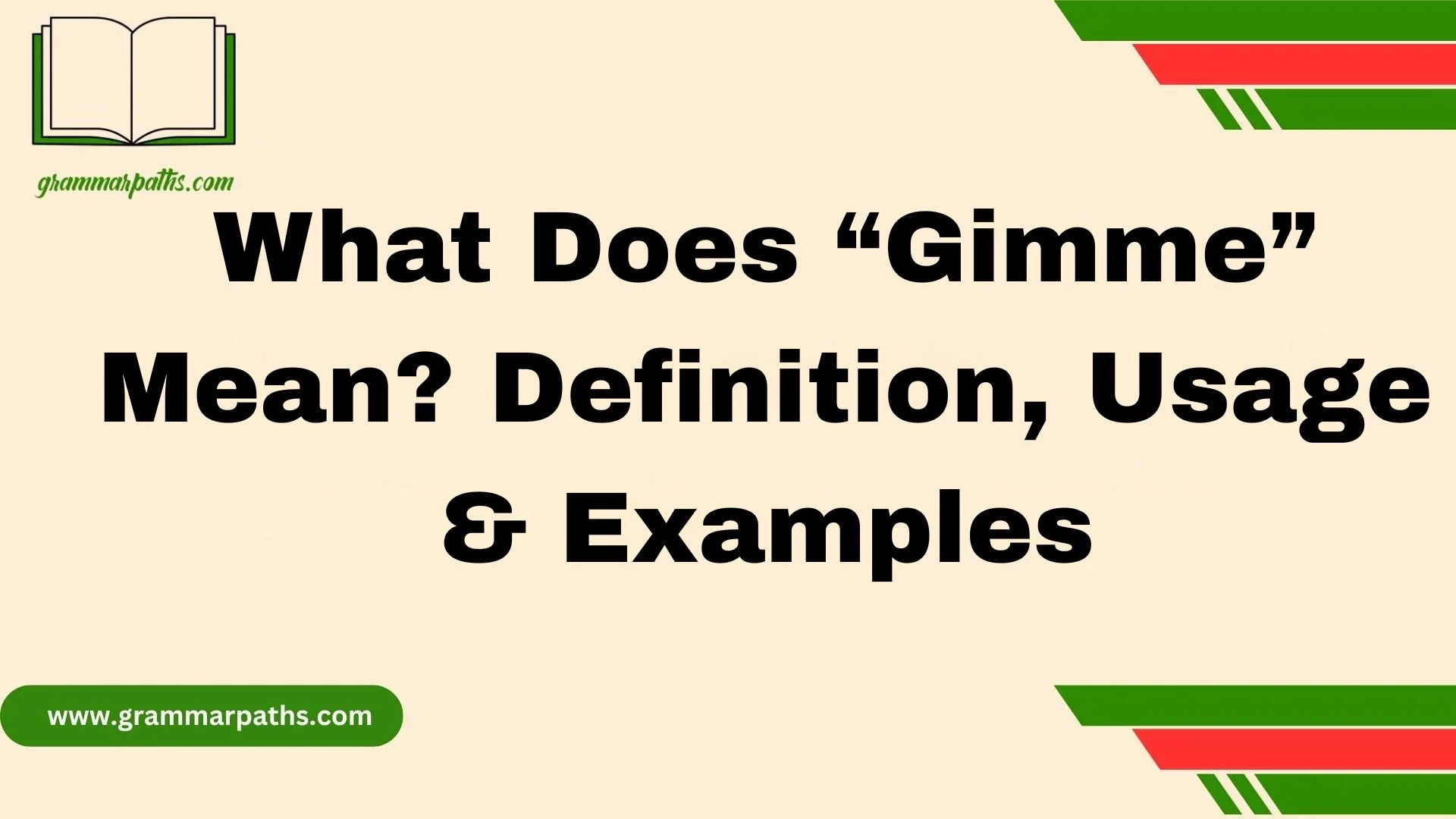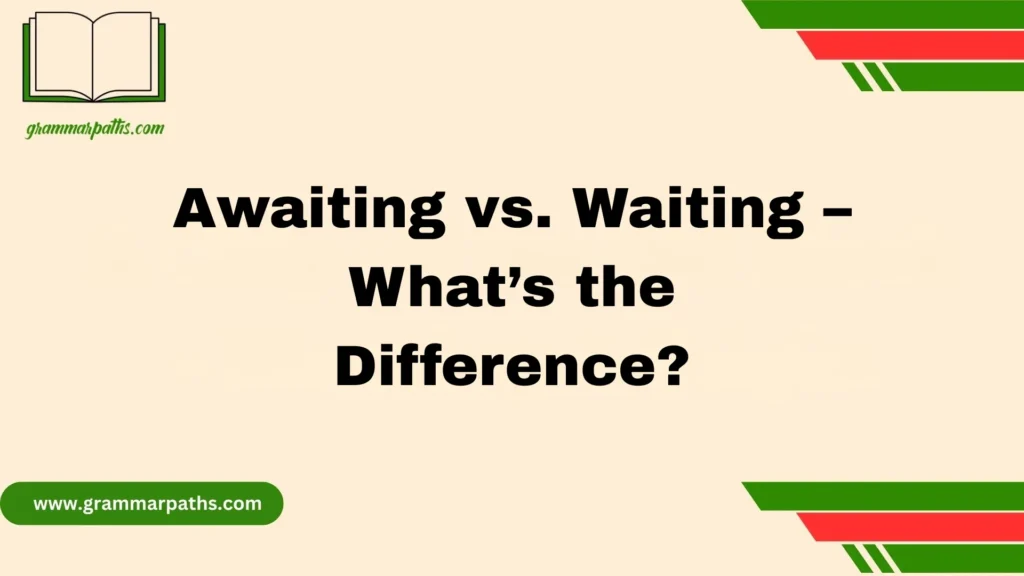When I first heard the word gimme on the golf course, it was during a friendly match with a friend who told me, “That short putt is a gimme.” In golf, the term simply refers to a short shot that’s so easy you don’t have to actually take it. But later, outside sports, I realized people often used it in casual talk as a colloquial contraction of “give me.” That shift made me see how language moves from specific places, like a game, into everyday speech.
Over time, I’ve noticed “gimme” used not only in golf circles but also in casual chats, music, and daily life. Some friends use it playfully, while others drop it naturally as part of their conversation. I’ve always liked how it carries a kind of metaphorical extension—starting as a phrase on the green, then stretching into slang that people everywhere understand. It’s a perfect reminder of how words can travel far from their starting point and still keep their charm.
What Does “Gimme” Mean?
At its core, “gimme” is a contraction of give me. It shows how spoken language often morphs into shorter, faster, and easier forms. In casual speech, the two words blend together, and over time, the written version “gimme” emerged to capture how people actually talk.
Here’s the simplest way to put it:
- “Give me” = formal, standard English.
- “Gimme” = informal, casual English.
For example:
- Formal: Could you give me a hand with this project?
- Informal: Gimme a hand with this, will you?
Notice how the second sentence feels more relaxed, even a little pushy. That’s because “gimme” carries a tone that can sound either playful or demanding, depending on how it’s used.
Etymology and Origin of “Gimme”
The word “gimme” has roots in spoken American English. Linguists call this kind of change a phonetic reduction—when frequently used phrases get shortened because people pronounce them quickly.
Historical evidence suggests “gimme” started appearing in written form in the late 19th to early 20th century, capturing how people naturally spoke in informal contexts.
Some key moments in its history:
- Early 1900s: Informal writing in plays and dialogue begins recording speech patterns like “gimme,” “lemme,” and “wanna.”
- 1950s–1960s: “Gimme” becomes mainstream, especially in American pop culture and music lyrics.
- Present day: Widely recognized as informal English, often used in texting, casual chats, and entertainment.
This progression shows how spoken language shapes written language, especially in an era when popular culture has massive influence on everyday speech.
Common Usage in Everyday English
You’ll hear “gimme” most often in informal conversations. It’s the kind of word that rolls off the tongue when you’re speaking quickly or casually with people you know well.
Everyday Settings:
- Friends and family: “Gimme a sec, I’ll be right there.”
- Texting or online chats: Shortcuts like “gimme” save time and feel natural.
- Street talk or casual slang: It adds informality and flow.
Regional Differences
While “gimme” is common across the United States, it’s especially widespread in pop-heavy urban areas like New York, Los Angeles, and Chicago, where cultural trends spread fast. Internationally, you’ll also hear it in places influenced by American music and movies.
Tone and Perception
Tone matters. In the right context, “gimme” can sound friendly, relaxed, or playful. But in other cases, it might come across as demanding or rude. For example:
- Friendly: “Gimme a smile, you’ll feel better.”
- Rude: “Gimme that report now.”
Formal vs. Informal Use
The biggest difference between “give me” and “gimme” lies in formality.
- Formal settings: Workplace emails, school essays, business reports, academic writing → always use give me.
- Informal settings: Texts, casual conversations, song lyrics, or friendly exchanges → gimme fits naturally.
Here’s a quick comparison:
| Context | Correct Usage | Avoid Using |
| Business email | Give me an update | Gimme an update |
| Academic essay | Give me evidence | Gimme evidence |
| Texting a friend | Gimme a minute | — |
| Song lyrics | Gimme shelter | — |
This table makes it clear: know your audience before using “gimme.”
Dictionary Definitions & Linguistic Insights
Most major dictionaries recognize “gimme” as informal English. Here’s what some say:
- Merriam-Webster: “Gimme — informal contraction of give me.”
- Oxford English Dictionary: “Gimme — representing informal speech, chiefly in North American English.”
- Cambridge Dictionary: “Gimme — informal for give me.”
From a linguistic perspective, “gimme” is an example of elision—when sounds or syllables are dropped to make speech faster and smoother. Other examples include “lemme” (let me), “gonna” (going to), and “wanna” (want to).
Examples of “Gimme” in Sentences
Casual Conversations
- “Gimme a sec, I’m on the phone.”
- “Gimme some water, please.”
- “Don’t gimme that excuse again.”
Everyday Requests
- At a restaurant: “Gimme the burger with fries.”
- At home: “Gimme the remote.”
- With friends: “Gimme a ride to the station.”
Professional Contrast
- Wrong in office: “Gimme your report by 3.”
- Correct version: “Please give me your report by 3.”
This contrast highlights how easily tone and professionalism can shift with just one word.
“Gimme” in Popular Culture
Few slang words have made their mark in music and film the way “gimme” has.
Music
- The Rolling Stones – “Gimme Shelter” (1969): A rock anthem that cemented “gimme” in cultural history.
- Britney Spears – “Gimme More” (2007): Pop culture embraced it again decades later.
- ABBA – “Gimme! Gimme! Gimme! (A Man After Midnight)” (1979): Proof of its global reach.
Film & TV
- Characters in comedies often use “gimme” to sound more casual, funny, or impatient.
- Screenwriters use it to capture realistic dialogue.
Pop culture not only reflects language but also shapes it. Millions of listeners worldwide picked up “gimme” through these songs, making it a truly international expression.
Variations and Related Slang
“Gimme” is part of a family of informal contractions used in speech:
- Lemme = let me
- Wanna = want to
- Gonna = going to
- Gotta = got to
- Kinda = kind of
These forms are perfectly fine in casual conversations but never recommended in formal writing.
Here’s a quick look:
| Informal Word | Full Form | Example Usage |
| Gimme | Give me | “Gimme the keys.” |
| Lemme | Let me | “Lemme see that.” |
| Gonna | Going to | “I’m gonna call him.” |
| Wanna | Want to | “I wanna go home.” |
Misconceptions About “Gimme”
There are a few common misconceptions:
- Myth: “Gimme” is incorrect English.
Truth: It’s not wrong, but it’s informal. - Myth: Using “gimme” makes you sound uneducated.
Truth: It depends on context. In a song lyric or text, it feels natural. In a business report, it feels sloppy. - Myth: “Gimme” is new slang.
Truth: It’s been in use for well over a century.
Practical Guide: When (and When Not) to Use “Gimme”
Think of “gimme” as a tool. Use it wisely.
When It Works:
- Texting friends or family.
- Writing dialogue in a novel or script.
- Quoting lyrics or popular culture.
- Casual requests where tone isn’t too serious.
When to Avoid:
- Job applications.
- Academic papers.
- Formal business writing.
- Professional emails.
Here’s a quick table to make it easier:
| Situation | Use “Gimme”? | Safer Option |
| Chat with a friend | ✅ Yes | Either works |
| College essay | ❌ No | Give me |
| Music lyrics | ✅ Yes | Gimme |
| Office meeting | ❌ No | Give me |
Conclusion
The word gimme may look casual, but it holds a unique place both in language and in culture. From its original meaning in golf—a short putt that’s too easy to miss—to its role as a colloquial contraction of “give me,” the term has stretched into a metaphorical extension far beyond the course. Whether used in sports, music, or daily conversation, “gimme” shows how words evolve and adapt, carrying both simplicity and style into modern communication.
FAQs
Q1: What does “gimme” mean in golf?
A: In golf, a “gimme” refers to a short putt that’s so easy the other player allows you to skip it.
Q2: Is “gimme” a proper word?
A: Yes, it’s accepted as a colloquial contraction of “give me,” though it’s considered informal.
Q3: Where is “gimme” used outside sports?
A: You’ll often hear it in casual speech, music lyrics, and sometimes in playful writing, showing its metaphorical extension beyond golf.
Q4: Can I use “gimme” in formal writing?
A: Not really. Since it’s informal slang, stick to “give me” in formal or professional settings.
Q5: Why do people like using “gimme”?
A: It feels natural, quick, and relaxed, which makes it perfect for casual conversation.

Grace Marie is the dedicated writer behind GrammarPaths.com, where she shares her passion for English grammar, idioms, and writing mastery. With a strong background in language studies and years of experience helping learners improve their communication skills, Grace creates clear, practical, and engaging content that makes English easy to understand.










